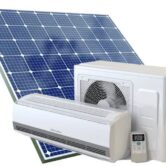Looking to power your refrigerator, air conditioner, and TV with solar energy? Discover how much solar capacity you really need, average appliance power usage, and how to size your solar system for reliable, eco-friendly performance—all in one clear guide.
As energy costs rise and environmental concerns grow, more homeowners are turning to solar power to run everyday appliances. A common question is: how much solar capacity is needed to power a refrigerator, air conditioner (AC), and television? Let’s break it down.
1. Understanding Appliance Power Consumption
Before calculating the solar power needed, it’s important to know the average energy use of each appliance:
- Refrigerator (Standard 300L):
~100–250 watts (average usage: ~1–2 kWh per day) - Air Conditioner (1.5 Ton Inverter AC):
~1,200–1,500 watts when running (can consume ~4–6 kWh per day depending on usage) - LED Television (32–55 inch):
~60–150 watts (typically ~0.5–1 kWh per day)
2. Total Daily Energy Consumption
Let’s estimate energy consumption per day:
| Appliance | Estimated Daily Use | Daily Energy (kWh) |
|---|---|---|
| Refrigerator | 24 hours | 1.5 kWh |
| AC | 6–8 hours/day | 5.0 kWh |
| Television | 4–6 hours/day | 0.75 kWh |
| Total | — | 7.25 kWh/day |
3. Solar Panel Capacity Required
To power all three appliances:
- Daily energy need: 7.25 kWh
- Average sun hours/day: 4–6 (depending on location)
Formula:
Required Solar Capacity (kW) = Daily Energy Need / Sun Hours
Using 5 average sun hours/day:
7.25 ÷ 5 = 1.45 kW
Add ~20% buffer for inefficiencies and cloudy days:
1.45 × 1.2 = ~1.75 kW
So, a 1.75 kW solar system (around 5–6 solar panels of 300–350W each) is typically sufficient.
4. Battery Backup (Optional)
If you want to run these appliances at night or during power outages, you’ll need battery storage:
- Recommended battery size: At least 7–10 kWh of storage
- Lithium-ion batteries are ideal due to efficiency and lifespan.
5. Final Thoughts
To reliably power a refrigerator, AC, and television using solar energy, a 1.75 kW solar system is a good starting point. However, the actual capacity may vary based on:
- Local sunlight availability
- Appliance efficiency
- Daily usage habits
- Whether you’re connected to the grid or off-grid
For accurate sizing and installation, it’s best to consult a certified solar installer.
Ready to Go Solar?
If you’re planning to switch to solar, we can help you choose the right system for your home. Contact us for a free consultation and quote tailored to your energy needs.





